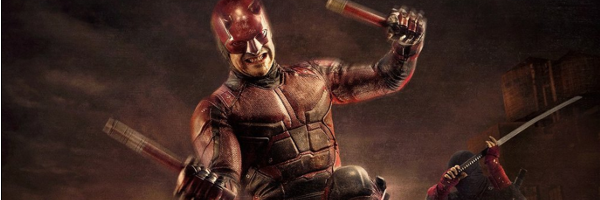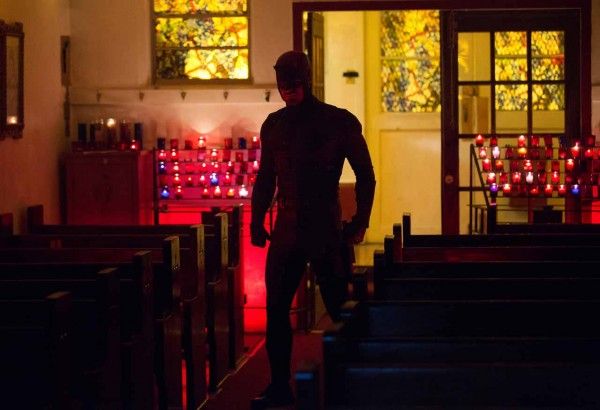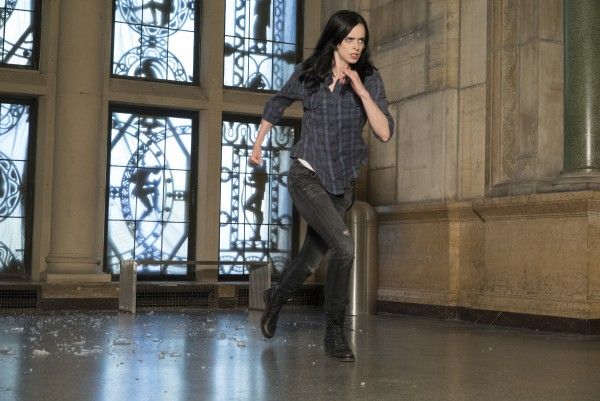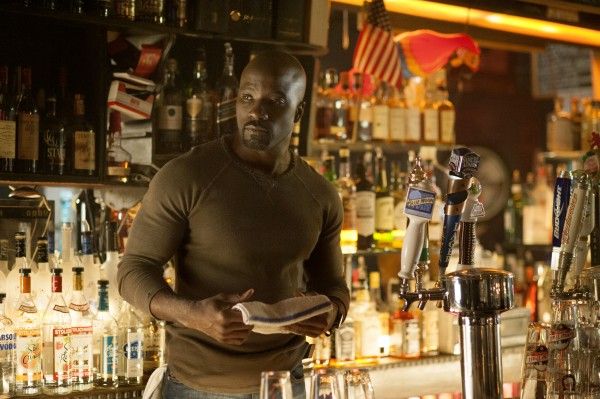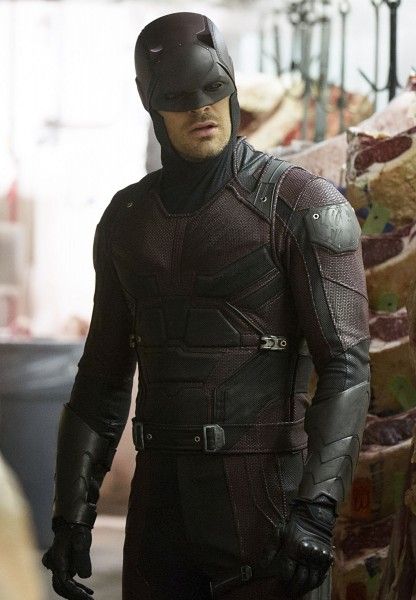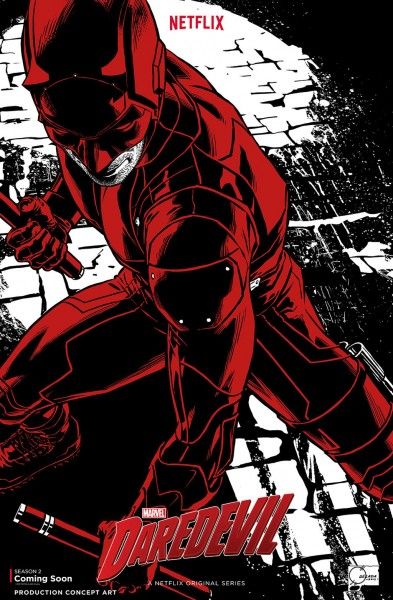Be aware that there are spoilers for Daredevil and Jessica Jones.
About this time last year, Marvel launched their fledgling Netflix MCU with the premiere of Daredevil, the flagship series in their televised Avengers-esque shared universe which would culminate in The Defenders, a self-described "miniseries event that reimagines a dream team of self-sacrificing, heroic characters." When the official Netflix/Marvel collaboration was first announced, it called for "four serialized programs leading to a miniseries programming event." The four series in discussion were Daredevil, Jessica Jones, Luke Cage and Iron Fist. It wasn't clear when or what order they would arrive in (or if they would ever tie in with the cinematic MCU, for that matter), but the plan was to introduce the members of the dream team via their individual series and eventually throw them all together.
Then Daredevil arrived, and it was a tremendous hit, loved by fans and well-received by critics. A second season was ordered in a matter of days. Then Jessica Jones -- a riskier show based on a brash, largely unknown female character -- debuted in November and instantly became a critical darling and another popular success. A second season was ordered within a matter of weeks. Now, with the release of Daredevil's second season, which has been praised by audiences and critics alike as an overall improvement on an already strong foundation, Luke Cage on the horizon in September, Iron Fist gearing up for production, and Jessica Jones Season 2 set for an undisclosed date on the increasingly packed schedule, the big question becomes -- when exactly will we see The Defenders? Not only that, but at what point will idea of The Defenders sprout within the overarching narrative of the Netflix MCU?
Because so far, it hasn't. Sure, some characters have crossed paths – most notably Jessica Jones and Luke Cage – but the idea that these street-level vigilantes will eventually team up isn't even on the periphery of their outlook yet. When Jessica Jones debuted, audiences were perhaps a bit spoiled by the super-powered menagerie on display in the cinematic MCU, and there was hope that Matt Murdock might show up (especially given how the characters ran in similar legal circles). No dice. The first season of Jessica Jones made it clear that Marvel's plan is to play things much more coy. Instead, it was the nurse extraordinaire Claire Temple who arrived in Jessica and Luke's hour of need, and all Matt got was a vague reference. Sgt. Brett Mahoney also popped up at one point, but other than those two ancillary appearances and a couple hard to catch background details, Daredevil's presence was nowhere to be found. Perhaps most interestingly, David Tennant's electric villain Kilgrave, who was speculated as a potential Defenders big bad, died in the season finale. An unexpected move because, while Kilgrave is most commonly associated with Jessica Jones thanks to his terrifying run in 'Alias', he was initially introduced as a Daredevil villain, and indeed, thanks to Daredevil's hardcore will power, Matt was canonically the only hero who was able to overpower Kilgrave's mind control.
But Daredevil was never meant to meet The Purple Man in the Netflix MCU, and it's for the best. The reason Matt Murdock doesn't pop up in Jessica Jones is because that season's story belonged to her. Luke Cage fits within that context because his and Jessica's narratives are deeply linked; he's an intrinsic part of Jessica's story, but ultimately Jessica's story is the only one Jessica Jones needed to tell. Likewise, the first season of Daredevil was Matt Murdock's story, just as I'm certain Luke Cage will be the story of Luke and Iron Fist that of Danny Rand.
Point being, after the success of their cinematic MCU, Marvel is very much taking an "if it ain't broke" mentality to their shared universe world building, and that means slow and steady. It took four years to get from Iron Man to The Avengers, and another three to get to Avengers: Age of Ultron, and the way to those massive-scale ensemble pieces was paved with individual arcs for the members of the team. You can't have a Captain America: Civil War that means a damn without the solo Iron Man and Captain America movies first. Good payoff demands good set up, and good set up demands time.
The unfortunate counterpoint to Marvel's method was revealed when Batman v Superman: Dawn of Justice hit theaters last week. It's a point I'm hesitant to even bring up because of how often these conversations dissolve into name-calling accusations between loyalists, but given the proximity of the release dates for BvS and Daredevil Season 2, the contrast between storytelling methods is impossible to miss. The most obvious and significant difference being how the universes are being constructed – one over a matter of years, and one in a matter of two and half hours. I don't say this to drag Batman v Superman through the mud, it has some stunning qualities, but storytelling is not one of them. The goal for these enormous event team-ups is to create a whole that is greater than the sum of its parts, but Batman v Superman ends up being overrun by parts that don't add up to a whole.
Because there are so many moving pieces, so few of them fully realized and so many of them nothing more than a set-up for what's to come, not one of those pieces amounts to its full potential. The film serves as more of a database from which the future stories are meant to derive than a foundation from which those stories will build. It's a bit like building an upside down pyramid. It's so interested in setting up the story of a sequel, it doesn't have time to be much of anything else. (In the interest of fairness, I'll point out that Age of Ultron suffered from many of these same issues, but Joss Whedon is a gifted ensemble storyteller and was able to make the onslaught much more palatable.)
Again, this isn't to hurl invective at the DCEU (for instance, DCTV series on the CW have done a great job of building and connecting their worlds), but a contrasting reference point to illuminate why it makes sense that Marvel is taking their sweet ass time building the Netflix MCU. It's simply better, more fulfilling storytelling. It not only makes the individual seasons stronger, it will ultimately make the eventual team-up more satisfying. It's tough to wait so long to see these heroes interact (personally, I can't wait to see Matt Murdock and Jessica Jones have a sullen brood-off), but it will be so much more engaging when we know who these characters are and what they have on the line. Of course we want to see Luke Cage and Iron Fist battling a big bad side-by-side, but that will be so much more fun when we know the strengths and weaknesses they bring to the fight.
That's not to say that there hasn't been progress made toward The Defenders. As they did with their theatrical MCU, Marvel is planting seeds with every step, and Daredevil Season 2 planted the most yet. Claire referenced her encounter with Luke Cage, and Marci straight up name-dropped Jessica Jones. And as the season draws to a close, even bigger strides are taken. Carrie-Ann Moss guest-starred in the final episode, recruiting Foggy to her firm in the wake of the tragic bro breakup of Nelson and Murdock. It's a move that will likely bring Foggy to Jessica Jones Season 2, Iron Fist (Jeri Hogarth's comic book counterpart is best known as Danny Rand's lawyer), or both. Claire Temple resigned from her job at Metro-General, a move we know will bring her into the first season of Luke Cage, and potentially set her up as the Netflix MCU equivalent of the Night Nurse (or possibly Nick Fury, as she is currently the only character who has appeared in all the series to date).
What's more, Daredevil's second season introduced to major Marvel players – Elektra and The Punisher, both of whom could easily spin off into their own series and will almost certainly factor into Marvel's grand scheme. While The Punisher is not a team player and will probably never be a card-carrying member of The Defenders, he's undeniably a great clutch player who can contribute in the eventual battle royale. As for Elektra, she is now tied in with The Hand as their Black Sky incarnate, and it seems likely at this point that The Hand is being set up as a major big bad, if not the big bad of the Netflix MCU. Daredevil Season 2 lays lots of seeds; they just aren't sprouting yet.
We don't know when The Defenders will hit. We do know that Luke Cage is up next, and if Netflix's previous pattern is any indication, Iron Fist will be after that. Jessica Jones is confirmed for a second season, but it's unclear if that will arrive before or after The Defenders. Daredevil is yet to be confirmed for a third season, but it's almost unfathomable that it wouldn't get one at this point. Then there's the matter of follow-up seasons for Luke Cage and Iron Fist if they're as successful as their predecessors. Crowded schedule aside, there's still a lot of narrative ground to cover before the team-up would even make sense. More threads are needed to tie them together, and a clear threat is needed to force them into action, but it looks like we're going to have to wait a while to see it happen.
For more on Daredevil and the Netflix MCU, check some of out our most recent coverage below.
- ‘Daredevil’ Recap: “Penny and Dime” – The Greatest Marvel TV Episode Ever?
- ‘Daredevil': 15 Burning Questions After Season 2
- Daredevil vs Punisher: Top 5 Fights from the Comic Books
- ‘Daredevil’ Season 2 Easter Eggs Connect Marvel’s Comic, TV, and Cinematic Universes
- ‘Daredevil’ Season 2 Just Delivered the Best Punisher Yet

